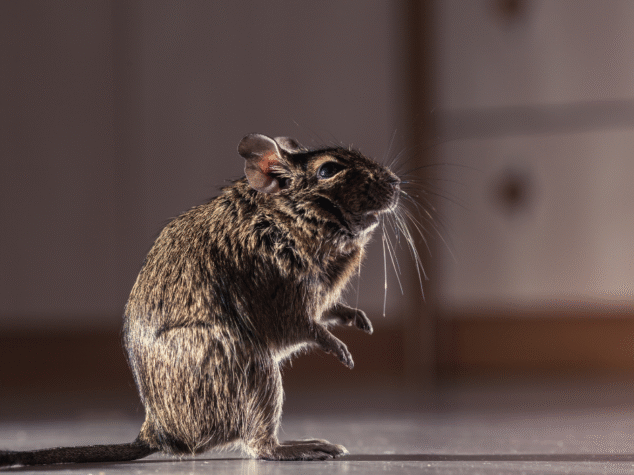Rodents are one of the most common and troublesome pests that homeowners, restaurant owners, and office managers face. Whether it's rats or mice, these creatures can find their way into the walls of buildings, often without anyone noticing until it’s too late. While they might seem harmless, rodents in the walls pose significant risks to the structure, health, and reputation of your property.
Understanding the dangers they bring and how to address the issue is essential for keeping your space safe and secure. Let’s take a closer look at why rodents are drawn to the walls, the risks they bring, and how to prevent and handle infestations in homes, restaurants, and office spaces.
Why Do Rodents Seek Shelter in Walls?
Rodents, especially rats and mice, are opportunistic creatures that will take advantage of any available shelter. Walls, particularly hollow ones or those with accessible entry points, provide the perfect hiding space. Here's why rodents make their way into walls:
1. Shelter and Safety
Rodents seek out quiet, undisturbed areas to build their nests. The interior walls of a building offer a safe and dark environment away from predators. Once inside, they create nests using insulation, paper, and fabric, which can be found in abundance.
2. Easy Access to Food
Rodents are always searching for food, and even small crumbs or spilled food can be enough to draw them in. Kitchens, pantries, and office breakrooms provide easy access to food sources. They can travel along wall voids to access hidden food in cabinets or under appliances.
3. Warmth and Comfort
Rodents are attracted to warm places, especially during the colder months. The temperature inside walls is often consistent, making it an ideal space for nesting.
Risks of Rodents in the Walls
Having rodents in your walls is not just a nuisance—they pose a serious threat. Here’s how rodents can affect homeowners, restaurants, and office spaces:
1. Health Risks
Rodents are known carriers of various diseases, some of which can be transmitted directly to humans. Their urine, droppings, and saliva can carry pathogens that cause diseases like leptospirosis, salmonella, hantavirus, and lymphocytic choriomeningitis virus (LCMV). Rodents also spread parasites like fleas, ticks, and mites, which can further jeopardize health.
2. Structural Damage
Rodents have strong teeth that allow them to chew through materials like wood, drywall, insulation, and even electrical wiring. Over time, this can lead to significant structural damage, including weakened walls, compromised insulation, and damaged electrical systems, which could result in costly repairs or even fire hazards.
3. Contamination of Food and Supplies
In restaurants and office kitchens, rodents can easily contaminate food and supplies by leaving droppings or gnawing through packaging. This not only results in lost inventory but also presents a serious health risk to employees and customers. In restaurants, it can even lead to fines or temporary closure if the infestation is severe enough.
4. Bad Odors
As rodents live and die within the walls, their presence can cause foul odors to permeate throughout the building. This is especially noticeable in areas where rodents have died and begun to decay. In restaurants and office spaces, this can create an unpleasant environment for customers and employees alike.
5. Damage to Property
Rodents will chew on anything they find, including furniture, wires, insulation, and plastic pipes. If left unchecked, they can cause expensive damage to property and equipment. For office spaces, this can destroy important documents, computers, or communication systems.
How to Prevent and Address Rodents in the Walls
1. Seal Entry Points
The first step in preventing a rodent infestation is to seal any potential entry points. Rodents can squeeze through small gaps, cracks, and holes in walls, around windows, doors, and pipes. Inspect the exterior of the building and repair any damage. Pay attention to areas where wires and pipes enter the walls, as these are common entry points.
2. Keep Food and Garbage Secure
For restaurants and office spaces, keeping food and garbage securely stored is essential in discouraging rodents from entering. In kitchens and breakrooms, clean up spills immediately, and store food in sealed containers. In restaurants, ensure that all food waste is disposed of promptly, and garbage bins are tightly closed.
3. Regular Inspections
Routine inspections by a pest control professional are crucial for identifying signs of rodent activity before it becomes a full-blown problem. Look for signs such as droppings, gnaw marks, and greasy stains along walls or floors. A professional can also check for hidden nests in your walls.
4. Use Rodent Traps or Baits
Once a rodent infestation is suspected, setting up traps or placing bait in strategic areas is necessary. For walls, it’s best to use traps that can be placed inside wall voids or around the perimeter of the building. Always consult a professional for the best approach, especially if the infestation is widespread.
5. Maintain Cleanliness
For homeowners, maintaining a clean property both inside and out can help keep rodents at bay. This includes keeping the yard tidy, trimming back shrubs and trees, and removing any outdoor food sources such as bird seed or pet food. Inside, regular cleaning of floors, counters, and storage areas will make your home less inviting to pests.
6. Professional Pest Control
If you suspect you have rodents in your walls, it’s best to call in professional pest control services. Pest control technicians can identify the extent of the infestation and use appropriate traps, baits, and sealing techniques to address the problem. They will also provide guidance on how to prevent future issues.
Rodents in the walls are more than just a nuisance—they can pose serious risks to your property, health, and business. Whether you’re a homeowner, restaurant owner, or office manager, addressing the problem early is essential to minimizing damage. By taking preventive measures, staying vigilant, and seeking professional help when necessary, you can keep your property safe and free from the risks of rodent infestations.

